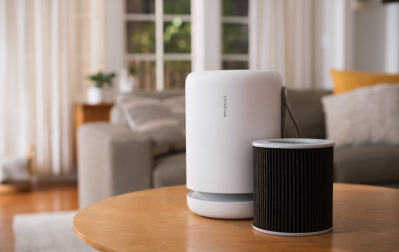Top 3 Best Air Purifier Reviews
- Updated: Oct 4st, 2020
We Researched, Tested the Best Air Purifier (Made in USA )
A great air purifier can really improve your life. But to qualify as great, it needs to be powerful enough to clean the air in a large living room or playroom, quiet and dark enough for you to sleep near it in a bedroom, and inexpensive enough that it’s reasonable to have several spread throughout your home. Few machines meet that standard, but after seven months of trying 12 different air purifiers, we believe the exceptional Vertox® Air Purifier is the best among them.
I’ve extensively researched the field of products, tested the extra features on a dozen of the most popular models, interviewed various experts in the field of indoor air quality and written up the definitive list of the best air cleaners around. Ready to buy an air purifier? Look no further.
A short list:
- Helps purify the air of dust, allergens, viruses, mold spores, odors and smoke.
- For rooms up to 800 square feet (40’ x 20’).
- Easy setup and filterless.
- Can help fatigue, eye strain, irritability and headaches.
- Airflow output exchange rate of 150 feet per minute.
- Outputs 3.4 trillion ions per second.
- Absolutely silent, fanless- no motor noise
9.2

"Perfect for home"
78 Reviews
How we decided

Limited time: Get 20% OFF
- Our #1 Most Popular Choice
- Helps combat against:* Dust, Mold Spores, Pollen, Smoke, Viruses, Fumes, Odors, Allergens
- Rechargeable up to 28 hours of run time
- Inactivates Coronavirus particles by generating ultraviolet light
- Helps you Breathe easier when in waiting rooms or on a plane.
- Helps destroy many pollutants and viruses or propelled away from wearer.
- Ships from USA, Maintenance Free
- Money back guarantee
- Ideal for air travel, movie theaters, waiting rooms or any confined space.
- Four US patents granted.
- Best Price on the Market: $120
Limited time: Get 20% OFF
9.7

"Excellent"
167 Reviews
- Cleaner, fresher air anywhere you travel.
- Silent, filterless, fan-less, maintenance free operation.
- 800,000 ions/cubic centimeter.
- Cigarette lighter socket plug in ionic air purifier.
- Aircraft type polycarbonate construction.
- Tested by leading scientists.
- Affordable, Under $60
8.5

"Great"
48 Reviews
BEST PORTABLE AIR PURIFIER of 2020
Vertox® Room Air Purifier
How it Works
Beginning the moment you plug it in, the Vl-3500 releases powerful steam of 3.4 trillion ions per second into the air in a pulsing “on-off” cycle. During the “on” cycle, powerful vortex waves of ions are electronically swirled into the air at a rate of 150 feet per minute, effectively washing the air of even the most microscopic pollutants. Meanwhile, a built-in ion detector monitors ion production levels. During the “off” cycle, the ionized pollutants fall harmlessly to the foam collector pad on the Vl-3500 or to the floor. The pollutants are removed during your normal vacuuming and dusting, and when you wipe the Vl-3500 pad clean.
And, unlike other ionization units, the Vl-3500 ion emitter stimulates airflow by discharging ions in a rapid, spiral vortex motion-actually drawing airborne pollutants to the device, instead of waiting for them to randomly pass near the unit.
After the recommendations…
Before getting into the details of which devices are best and why, it’s important to understand the basic mechanisms that these products use to clean your air. To get a handle on these methods, I talked to Richard Shaughnessy, director of Indoor Air Research at the University of Tulsa.
According to Shaughnessy, who has a doctorate in chemical engineering, most air cleaners run your air through a filter designed to catch particles you might otherwise inhale. These are usually High Efficiency Particulate Absorbing filters and they’re designed to capture 99.97% of particles sized 0.3 micron or larger. HEPA filters reliably remove smoke (including from wildfires), pollen, dust and other particulate matter that pollutes home environments.
Activated carbon offers another type of filter, which captures odors and gaseous pollutants that can slip through a HEPA filter. “[Carbon filters are] good … to an extent,” said Shaughnessy, “but they need to have a sufficient amount of carbon. You don’t want breakthrough happening where the carbon becomes fully saturated and it releases what was captured back into the air.”
According to multiple researchers I talked to, most consumer air purifiers simply don’t have enough activated carbon to be an effective odor filter for more than a short period of time.
Another common type of air cleaning works via ionic filtering. These filters can be effective, according to Shaughnessy, but they have a number of shortcomings: Some don’t actually remove particulate from the home, but rather cause them to attach themselves to surfaces around the home. Others must be cleaned consistently, or they might begin to emit ozone — itself a pollutant.
While some ionic purifiers are effective and standards for them have risen significantly in recent years, the benefits an ionic purifier offers over a HEPA filter are in many cases negligible — particularly given the risk they occasionally pose.
An important standard to keep an eye out for is the AHAM Verified Clean Air Delivery Rate, which tells you how much air a purifier can process in a given time frame. Not every company uses this standard, but most do.
Recommendations get a little more complicated when companies don’t list a CADR, or when they employ proprietary filtration methods.
What about Molekule?

You may have heard of another air purifier called Molekule, made by a company of the same name, which grabbed headlines for its attractive design and proprietary filtration technology back in 2017 — and is even, strangely enough, sold at the Museum of Modern Art in New York. What about that?
The Molekule presents a complicated problem: Its maker claims its proprietary PECO filter destroys particles much smaller than 0.03 micrometers, but it filters air at such a slow rate that, even if the company’s claims are accurate, it cleans the air very inefficiently compared with HEPA models (as Consumer Reports rightly pointed out in its highly critical review late last year).
On the other hand, the Lawrence Berkeley National Laboratory, one of the premiere indoor air research centers in the country, recently released a government-funded study showing that the PECO effectively filters out volatile organic compounds — that is, compounds that can easily become gaseous pollutants in the air, which HEPA filters do not capture. Reviewers at Consumer Reports and the New York Times’ Wirecutter, which called the Molekule’s larger model “the worst air purifier we’ve ever tested” and the Air Mini “the second-worst,” didn’t appear to test VOC reduction.
We can’t recommend the Molekule Air Mini Plus, which I tested, as a result of these problems coupled with a recent decision by the National Advertising Review Board to force a retraction of many of Molekule’s misleading advertising claims. That said, the air purifier does appear to address a problem that most HEPA-reliant cleaners simply don’t: the presence of gaseous pollutants in the home. Such pollutants have plenty of sources, whether from paint, furniture, cleaning solutions or even some composite boards. For that reason alone, Molekule’s eye-catching brand is worth keeping tabs on — especially as its latest air cleaner was just approved by the FDA as a Class II medical device.
Do you even need an air purifier?
Given the rise of COVID-19 over the past few months, you may be thinking about air purifiers in a fresh light. In home settings though, transmission usually occurs through close contact, which means an air purifier probably won’t protect you if a roommate or family member in the same house gets sick. Purifiers may help businesses and restaurants trying to improve the air in their indoor spaces.
Beyond COVID concerns, in home settings, air purifiers don’t offer much value to the average consumer. According to microbiologist and Vice President of Scientific Communications at the American Council on Science and Health Alex Berezow, “Unless you have some sort of medical condition (asthma, allergies), I just don’t think an air purifier is worth the money.”
Human lungs, Berezow pointed out in a recent blog post, filter the air we breathe sufficiently — especially in places like most parts of the United States, where air is fairly consistently clean.
On the other hand, for households with an asthmatic or otherwise immunocompromised child, air purifiers have significant benefits, according to Berezow and Dr. Elizabeth Matsui, a professor of population health and pediatrics at the University of Texas, Austin’s Dell Medical School.
Matsui has extensively researched the effects of air purifiers on children with asthma and says the devices can make a big difference — though they’re no substitute for well-ventilated and smoke-free homes or proper medical care. Furthermore, there is no evidence to suggest that air purifiers diminish the chance of children developing asthma.
In short, air purifiers are popular for a reason: They mostly do what they say, cleaning the air inside your home. And depending on your health needs, or if you live in a home with many sources of pollution, cleaner air might really make a big difference for you or your children. If you think the benefits of an air purifier might help someone in your own home, it’s always worth talking to an allergist. If you’d rather just grab an air cleaner and call it a day, you can’t go wrong with the recommendations above..
Tips
- Comfort: Since these need to be worn, you should look for a compact, lightweight model
- Price: Some of the products are more expensive than the others. While buying those you need to access whether the extra features are worth the extra money.
- Design: Look for a design that doesn’t look weird on you while in a public place.
- Efficiency: Look for the model that provides at least more than 90% efficiency
- Battery life: Since recharging is an added hassle, look for the model that has a longer running time.
Why trust us?
Even if you don’t know anything about air purifiers, you can still make a smart buying decision with the right information in hand. At BodyWinning, we perform extensive research in every product category. To avoid bias, we always decline offers from manufacturers for “free” samples. We want to be your go-to source for honest, thorough product reviews you can trust.




